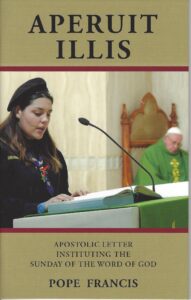Notes on the Apostolic Letter “The Sunday of the Word of God” (Aperuit Illis) by Pope Francis
Tom Gorman from Community writes about the Sunday of the Word of God which Catholics celebrate on the Third Sunday in Ordinary Time, which in 2023 is Sunday 22nd January (today). Tom’s notes draw out how much the Catholic Church has recently been renewing its ancient call for Catholics to live by God’s word in the scriptures. Our community is ecumenical and our members contribute from the riches of their own denominational setting; we hope Tom’s notes are an encouragement to friends from all traditions.
 The Pope opens the Letter by saying that the relationship between the Risen Lord, the community of believers and sacred Scripture is essential to our identity as Christians. Without the Lord who opens our minds to them, it is impossible to understand the Scriptures in depth. Yet the contrary is equally true: without the Scriptures, the events of the mission of Jesus and his Church in this world would remain incomprehensible. Hence St Jerome could rightly claim: “Ignorance of the Scriptures is ignorance of Christ”.
The Pope opens the Letter by saying that the relationship between the Risen Lord, the community of believers and sacred Scripture is essential to our identity as Christians. Without the Lord who opens our minds to them, it is impossible to understand the Scriptures in depth. Yet the contrary is equally true: without the Scriptures, the events of the mission of Jesus and his Church in this world would remain incomprehensible. Hence St Jerome could rightly claim: “Ignorance of the Scriptures is ignorance of Christ”.
The Pope first proposed the Sunday of the Word of God at the end of the Jubilee of Mercy. He wanted to set aside a Sunday given over entirely to the Word of God, so as to appreciate the inexhaustible riches contained in that constant dialogue between the Lord and his people.
The Second Vatican council gave great impetus to the rediscovery of the Word of God ……. It is fitting then that the life of our people should be constantly marked by this decisive relationship with the living word that the Lord never tires of speaking to his bride that she may grow in love and faithful witness.
 Pope Francis chose this time of year to celebrate the Sunday of the Word of God because at this time “we are encouraged to strengthen our bonds with the Jewish people and to pray for Christian unity …since the scriptures point out for those who listen the path to authentic and firm unity.
Pope Francis chose this time of year to celebrate the Sunday of the Word of God because at this time “we are encouraged to strengthen our bonds with the Jewish people and to pray for Christian unity …since the scriptures point out for those who listen the path to authentic and firm unity.
Pope Francis next writes about the encounter of Jesus and the two disciples on the road to Emmaus. They were devastated by the crucifixion of Jesus. They thought he was going to set Israel free. When Jesus met them Luke’s Gospel relates that: “… beginning with Moses and all the prophets he interpreted to them the things about himself in all the Scriptures” (Luke 24: 13 -35).
The Pope says that “not simply a part but the whole of Scripture speaks of Christ. Apart from the Scriptures, his death and resurrection cannot be rightly understood”. He goes on to say. “A profound bond links sacred Scripture and the faith of believers. Since faith comes through hearing, and what is heard is based on the word of Christ (Cf. Rm. 10:17), believers are bound to listen attentively to the word of the Lord, both in the celebration of the liturgy and in their personal prayer and reflection.
Later when Jesus met the apostles, he said to them “This is what I said to you while I was still with you that everything written about me in the law of Moses, in the Prophets and in the Psalms, must be fulfilled” (Luke 24: 44). Then he opened their minds to understand the scriptures. The Pope goes on to say: “…we urgently need to grow in our knowledge and love of the Scriptures and of the risen Lord who continues to speak his word and to break bread in the community of believers. For this reason, we need to develop a closer relationship with sacred Scripture Otherwise, our hearts will remain cold, our eyes shut, struck as we are by so many forms of blindness”.
The Pope then referred to Revelation 3: 20, where the Lord said, “Behold I stand at the door and knock” and added that we should always keep in mind the teaching found in the Book of Revelation: The Lord is standing at the door and knocking. If anyone should hear his voice and open for Him, He will come in and eat with them. Christ Jesus is knocking at our door in the words of sacred Scripture. If we hear his voice and open the door of our minds and hearts, then he will enter our lives and remain with us.
Pope Francis then quoted 2 Timothy 3:16, “All Scripture is inspired by God and useful for teaching, for reproof, for correction and for training in righteousness The verse continues: “That is how someone dedicated to God becomes fully equipped and ready for any good work.” (3:17)
And he then added an important qualification: “Without the work of the Spirit there would always be a risk of remaining limited to the written text alone. This would open the way to a fundamentalist reading. As the Apostle reminds us: “The letter kills, but the Spirit gives life” (2 Corinthians 3 :6). The Holy Spirit, then, makes sacred Scripture the living Word of God, expressed and handed down in the faith of his holy people.
 The work of the Holy Spirit has to do not only with the formation of sacred scripture; it is also operating in those who hear the word of God. Sacred scripture is to be read and interpreted in the light of the same Spirit through whom it was written (Dei Verbum, 12). We need to have confidence in the working of the Holy Spirit as he continues in his own way to provide “inspiration” when the Church teaches the sacred Scriptures, whenever the Magisterium authentically interprets them …. and whenever each believer makes them the norm of his or her spiritual life.
The work of the Holy Spirit has to do not only with the formation of sacred scripture; it is also operating in those who hear the word of God. Sacred scripture is to be read and interpreted in the light of the same Spirit through whom it was written (Dei Verbum, 12). We need to have confidence in the working of the Holy Spirit as he continues in his own way to provide “inspiration” when the Church teaches the sacred Scriptures, whenever the Magisterium authentically interprets them …. and whenever each believer makes them the norm of his or her spiritual life.
Near the end of the Letter the Pope says about the Mother of God….” She is the one who was called blessed because she believed in fulfilment of what the Lord had spoken to her” (cf. Luke 1: 45). He quoted a reflection by Saint Augustine who wrote: “Someone in the midst of the crowd seized with enthusiasm cried out: ‘Blessed is the womb that bore you’ and Jesus replied, ‘Rather, blessed are they who hear the word of God and keep it’. As if to say: my mother whom you call blessed, is indeed blessed, because she keeps the Word of God. Not because in her the Word became flesh and dwelt among us, but because she keeps that same Word of God by which she was made and which, in her womb, became flesh” (Tractates on the Gospel of John, 10,3)
Pope Francis ends his Letter with this with this statement of hope for the future: May the Sunday of the Word of God help his people to grow in “religious and intimate familiarity with the Sacred Scriptures. For as the sacred author taught of old: “This word is very near to you: it is in your mouth and in your heart for your observance” (Deuteronomy 30: 11, 14).
Dr Tom Gorman is a member of the House of the Open Door Community, an ecumenical community in the Archdiocese of Birmingham.
PDF version of this page: The Sunday of the Word of God












